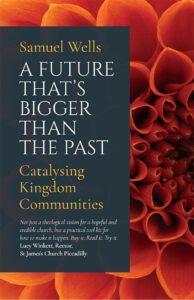 A Future That’s Bigger than the Past: Divinity Summer Book Club
A Future That’s Bigger than the Past: Divinity Summer Book Club
One of the goals of our Divinity Associates Executive over the last few years has been to expand our reach to include alumni and friends beyond the GTA. It was in this spirit that we tried something new: a seven-session Zoom-based book club from July to September. Building on his appearance at St. Anne’s and Trinity College last May, we discussed Sam Wells’ book A Future That’s Bigger than the Past: Catalysing Kingdom Communities. We were blessed to have Sam connect with us online for an introduction to the book for the first session, and to take participants’ questions for the last session.
While an overabundance of Zoom can be tiring (as we learned during the pandemic), it is nevertheless very worthwhile for its ability to shrink distance. We typically had 20-40 participants, with people connecting from several parts of Canada. Most were Anglican, though some came from the Eastern Orthodox Church. Many were longtime Christians; others were new to the faith, with this serving as one of their first faith-formation group study opportunities. We kept the agenda quite simple, with an extended breakout group discussion period, followed by about 15 minutes of full-group sharing.
The many experiences and perspectives voiced were very rewarding. I would recommend the book to those holding positions of congregational or diocesan leadership (of all varieties), for its theological and practical value. Sam (am I allowed to call him just “Sam” now?!) wrote the book having recognized the Church’s struggle to adapt to the ‘post-Christian’ west, while also noting that earlier models of supporting congregational life (e.g. through powerful and wealthy benefactors, or via grassroots stewardship) are becoming increasingly ineffective. He then paints a picture of Christian communities cultivating “abundant life” within and beyond their walls, growing in the “4 Cs” of compassion, commerce, culture, and congregational life. Taking the cryptic Parable of the Dishonest Manager as a guide, Sam advocates for congregations to embody the ethics of the Kingdom as they take on social/economic enterprises that have the potential both to sustain churches and bless individuals and communities.
Of particular interest is the book’s appendix in which Sam discusses the challenge of evaluating our efforts from both quantitive and qualitative perspectives. The result is a fascinating table comprised of aims and proximate goals, measurable by “hard metrics” (e.g. staff being paid a living wage) and “soft impressions” (e.g. experiences of reconciliation, welcome, and learning).
Consider buying a copy for your bishop, and mention that folks from Trinity College recommended it.
by Matthew Kieswetter
